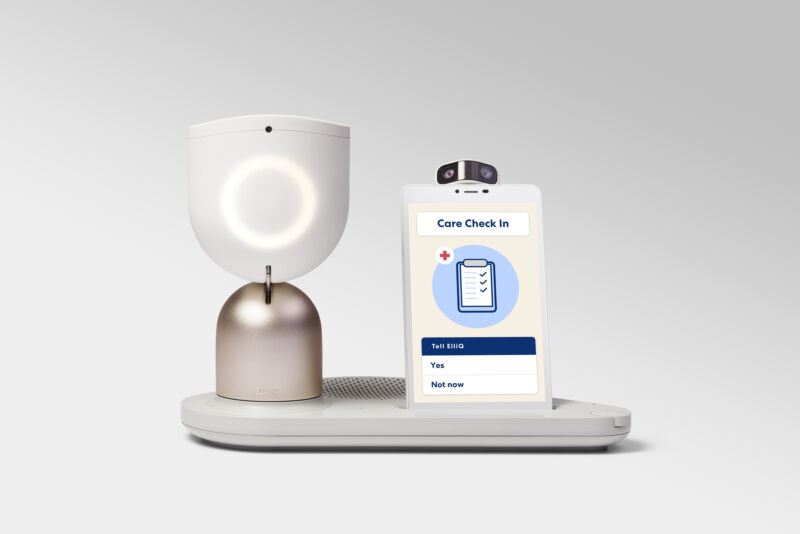Enlarge / ElliQ, an AI companion robot from Intuition Robotics. ElliQ reader comments 4 Some seniors in New York are successfully combating their loneliness with an AI-powered companion robot named ElliQ—while others called the “proactive” device a nag and joked about taking an ax to it. The home assistant robot, made by Israel-based Intuition Robotics, is offered to New York seniors through a special program through the state’s Office for the Aging (NYSOFA).
Over the past year, NYSOFA has partnered with Intuition Robotics to bring ElliQ to over 800 seniors struggling with loneliness. In a report last week, officials said they had given out hundreds and had only 150 available devices . ElliQ includes a tablet and a two-piece lamp-like robot with a head that lights up and rotates to face a speaker.
Marketed as powered by ” Cognitive AI technology ,” it proactively engages in conversations with users, giving them reminders and prompts, such as asking them how they’re doing, telling them it’s time to check their blood pressure or take their medicine, and asking if they want to have a video call with family. Speaking with a female voice, the robot is designed to hold human-like conversations, engage in small talk, express empathy, and share humor. It can provide learning and wellness programs, such as audiobooks and relaxation exercises.
Interest in using social robots, such as ElliQ, for elder care has been growing for years, but the field still lacks solid evidence that the devices can significantly improve health, well-being, and depression. Systemic reviews in 2018 found the technology had potential, but studies lacked statistical significance and rigorous design . The program in New York adds to the buzz but doesn’t offer the high-quality study design that could yield definitive answers.
In August, the state released a report on an unspecified number of ElliQ users, which indicated that the device was helpful. Specifically, 59 percent of users reported the device was “very helpful” at reducing loneliness, while 37 percent reported it was “helpful” and only 4 percent reported it as “unhelpful. ” Engagement with the device declined over time, with users initially interacting with ElliQ an average of 62 times a day in the first 15 days of use, which fell to 21 times a day between 60 and 90 days and 33 times a day after 180.
Advertisement Mixed feelings “We had high hopes for the efficacy of ElliQ, but the results that we’re seeing are truly exceeding our expectations,” Greg Olsen, director of the New York State Office for the Aging, said in a statement at the time of the report’s release. “The data speaks for itself, and the stories that we’re hearing from case managers and clients around the state have been nothing short of unbelievable. ” But other recent data on the potential for companion robots to reduce loneliness has indicated that there’s no one-size-fits-all approach.
There are a lot of factors that can influence how individuals perceive such a device. A 2021 qualitative study evaluated the responses from 16 seniors who were asked for feedback on three types of robot companions, including ElliQ. The results were mixed for the proactive robot.
While some felt the occasional chattiness of ElliQ would be comforting during an otherwise solitary day, others felt it was intrusive and “nagging. ” Some felt the device’s tone was “rude. ” “I don’t know whether that would drive me mental if it kept interrupting me and telling me what to do .
. . I might want to get an ax and cut it up,” one study participant said.
How welcoming a person might be to an assertive AI-assistant like ElliQ may link with a person’s general preferences regarding human company, the authors suggested. Those who value their space and autonomy may be less open to such as device compared with more gregarious seniors. While some participants said ElliQ’s reminders could be useful, others expressed a deep concern that an overreliance on technology for everyday tasks—like paying bills, taking medications, or turning lights off—could hasten the decline of cognitive and physical abilities.
Study participants also raised concerns regarding the inauthenticity of a relationship with a nonhuman, a loss of dignity, and a lack of control. Some disliked that ElliQ couldn’t be fully controlled by the user and was so assertive, which some perceived as pushy. Some worried about feeling embarrassed about being seen interacting with a robot companion.
A 2022 study also explored the issue of stigma , with participants expressing that the use of such devices could reinforce stereotypes of aging, including isolation and dependency. While researchers continue to explore the potential use and design of AI-powered companion robots, anecdotes from New York’s program suggest the tools are clearly helpful for some. One New Yorker named Priscilla told CBS News she found ElliQ helpful.
“She keeps me company. I get depressed real easy. She’s always there.
I don’t care what time of day, if I just need somebody to talk to me,” Priscilla said. “I think I said that’s the biggest thing, to hear another voice when you’re lonely. “.
From: arstechnica
URL: https://arstechnica.com/?p=1990239
